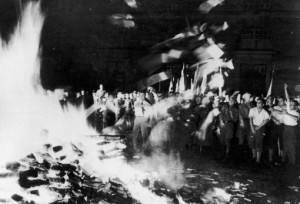Leo Robson reviews three new works concerned with banned literature.
BY LEO ROBSON PUBLISHED 25 JULY, 2014 – 12:35

A Nazi book-burning. Photo: Getty
The Zhivago Affair: the Kremlin, the CIA and the Battle Over a Forbidden Book
Peter Finn and Petra Couvée
Harvill Secker, 350pp, £20
The Most Dangerous Book: the Battle for James Joyce’s Ulysses
Kevin Birmingham
Head of Zeus, 420pp, £20
The Rushdie Fatwa and After: a Lesson to the Circumspect
Brian Winston
Palgrave Macmillan, 161pp, £55
“I think you must distinguish between a passage which says that homosexuals are sometimes happy and a passage which says: come and be a homosexual,” Frank Kermode argued at the 1967 obscenity trial in London for Hubert Selby Jr’s novel Last Exit to Brooklyn. In a later essay, he elaborated: “We have not always believed that poems, plays and novels should carry the label ‘No road through to action’, but we have believed it for a long time.” Well, we don’t seem to believe it any more, judging by the success of Oprah’s Book Club and Alain de Botton, or by the ubiquity of biblio-memoirs and testaments about “the book that changed my life”. And did we really believe it then? Although the Selby trial coincided with the battle for gay rights – homosexual acts were legalised the same year – and formed part of the story later charted in John Sutherland’s book Offensive Literature: Decensorship in Britain 1960-1982, the broader context for Kermode’s remarks was the ongoing cultural cold war, in which the CIA and the Kremlin and, for that matter, a large contingent of professional critics believed strongly in the relationship between writing and advocacy, reading and action, as Kermode knew all too well.
Earlier in 1967, Kermode had resigned from the co-editorship of Encounter magazine over revelations – which came as news to just about no one – that its original backer, the Congress for Cultural Freedom, was in turn being funded by the CIA. Kermode later noted that his own business had mainly been with “the non-political part of the magazine”, the arts and books pages, but the aim of the Congress for Cultural Freedom was not to liberate culture from politics but to emphasise the connection between culture and liberal politics at a time of legitimate fears that literature was seen as a far-left pursuit. As Frances Stonor Saunders writes in her formidable book Who Paid the Piper?: “The whole premise of the cultural cold war, of the Congress for Cultural Freedom, was that writers and artists had to engage themselves in the ideological struggle.”
